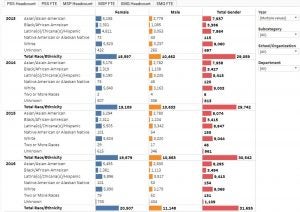Fellow Bruins,
The Piterberg matter
Higher education is confronting the serious problem of sexual harassment. The issue constantly hits the headlines, and the University of California is not immune. Even on our own campus, a lawsuit filed against Prof. Gabriel Piterberg has shined a harsh light.
As students protested and the media shared the story, I and others in the Administration received numerous emails and letters. Recently, I sent formal replies to the community most affected — concerned members of the faculty, staff, and alums of the History Department.
But transparency benefits all of us. So, let me share with you the text of that letter, so that you too know what’s going on. (I’ve added some hyperlinks to make the letter more useful.)
The Letter
March 11, 2016
Thank you very much for your letter . . . about the 2014 UCLA settlement with Professor Gabriel Piterberg and his upcoming return to campus. . . . As you likely know, we have received multiple letters expressing similar concerns, sent by faculty, students, and alums. At their core, they all ask heartfelt and basic questions of justice: Did the punishment fit the “crime”? Did confidentiality trump public accountability? How can the community be restored?
Because of the ongoing lawsuit, I can’t discuss these important questions freely. But I can say something.
1. Severity of sanction
We have recently negotiated an agreement that permits detailed disclosure of all the terms of Prof. Piterberg’s settlement (“resolution agreement”). Even if many believe that the discipline imposed wasn’t harsh enough, it’s important to have an accurate measure of what the consequence actually was. For example, Prof. Piterberg did not lose only $3,000 as some media outlets have reported, but was suspended without pay for a quarter, which meant losing a third of his salary ($50,333). He was also barred from directing a center during his suspension, which meant losing a third of the payment associated with that position ($13,419 in summer monies and stipend). We are in the process of conducting an internal audit to make sure that Prof. Pieterberg experienced the full financial loss.
Because of the settlement, he was also deemed ineligible for renewal as director of the center, which means that he had to forego potentially $40,800 in terms of payment associated with that position (using 2015-16 figures). It’s of course impossible to know counterfactually whether Prof. Piterberg would have been renewed and for how long without this settlement. But there was certainly some financial loss in salary foregone. Finally, other terms restrict his contact with students and subject him to a fast-track disciplinary process for any future misbehavior.
For many, this may not be enough. And the talk of dollars, I know, risks commodification. My modest point is that the sanctions weren’t trivial.
2. Opacity or secrecy
The University will respond to questions about the past in the course of the pending litigation. But those with concerns today must understand that this matter all took place before the new Title IX Office was created, before the Office of Equity, Diversity and Inclusion was created, and before new policies and procedures on sexual harassment and violence were adopted. Going forward, these new procedures greatly increase transparency by providing key information to the complainant about the investigation, its findings, and their consequences. The Title IX coordinator, Kathleen Salvaty, and I fought hard to make sure that such provisions – as well as others that increase accountability and student safety – were included in the new policy.
3. Restoring the community
Finally, and most importantly, the greatest challenge is to restore the community. My fundamental commitment is to build an equal learning and working environment for all, and the letters I have received demonstrate how Prof. Piterberg’s return risks undermining that environment. We are thinking intensely and creatively about solutions. All possible variables regarding office location, teaching time, teaching arrangements, and service responsibilities are being examined. The settlement already includes various constraints on how Prof. Piterberg may interact with students. Our goal continues to be crafting some arrangement that responds to the concerns expressed while making sure that bad behavior is not inadvertently rewarded (for instance, with less work or responsibility). What society does with those who have violated institutional norms when they return to the community presents hard questions about retribution, deterrence, rehabilitation, and closure. The University is no exception.
The Administration is committed to greater dialogue and creative problem-solving. Title IX Coordinator Kathleen Salvaty, Campus Assault Resources and Education Advocate Victoria Molina, Vice Chancellor of Academic Personnel Carole Goldberg, and I have all spoken to various constituencies in the History Department. The chair of the department, Stephen Aron, has been meeting with students regularly to hear concerns and accommodate requests that class schedules and dissertation committees be reworked. The department has also drawn on its own resources to adjust funding packages for students who have been impacted. Vice Chancellor Carole Goldberg and I are planning to meet with you [History Graduate students] in person to continue the conversation and to listen to your concerns. We are open to still further visits with faculty, students, staff, and alums to try to forge together possible solutions.
I realize that none of this may be satisfying. It is, however, an honest and transparent account of how we are working together, to make things better, going forward.
Sincerely,
Jerry Kang
Vice Chancellor, Equity, Diversity and Inclusion
I launched CrossCheck to try to disrupt business as usual–to promote emotional honesty and structural accountability. To my fellow Bruins, I say keep holding me accountable. Keep me in check.






